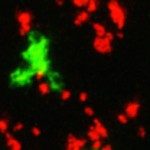Link to Pubmed [PMID] – 24177426
J. Clin. Invest. 2013 Dec;123(12):5098-103
Anti-CD20 Ab therapy has proven successful for treating B cell malignancies and a number of autoimmune diseases. However, how anti-CD20 Abs operate in vivo to mediate B cell depletion is not fully understood. In particular, the anatomical location, the type of effector cells, and the mechanism underlying anti-CD20 therapy remain uncertain. Here, we found that the liver is a major site for B cell depletion and that recirculation accounts for the decrease in B cell numbers observed in secondary lymphoid organs. Using intravital imaging, we established that, upon anti-CD20 treatment, Kupffer cells (KCs) mediate the abrupt arrest and subsequent engulfment of B cells circulating in the liver sinusoids. KCs were also effective in depleting malignant B cells in a model of spontaneous lymphoma. Our results identify Ab-dependent cellular phagocytosis by KCs as a primary mechanism of anti-CD20 therapy and provide an experimental framework for optimizing the efficacy of therapeutic Abs.
